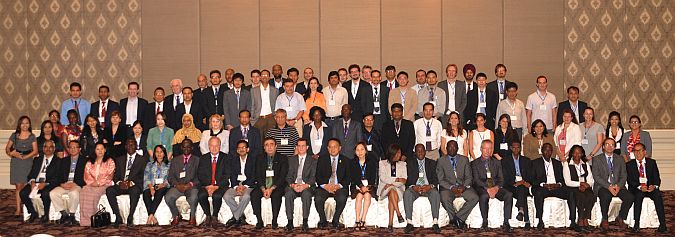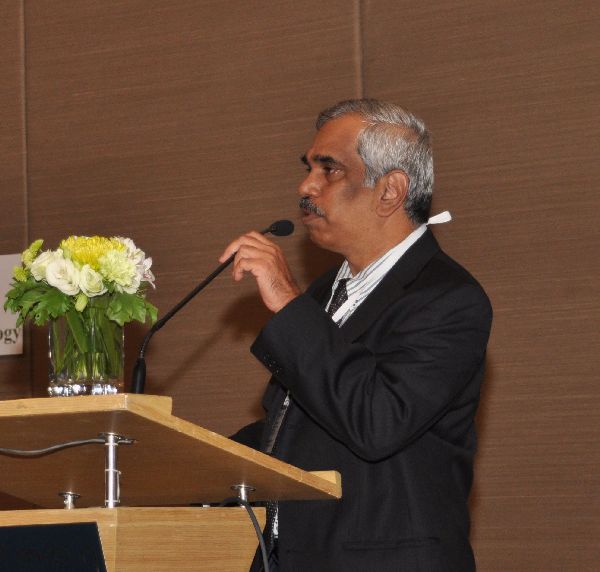Funded by United Nations Environment Programme (UNEP) and the Global
Environment Facility (GEF), the event held on 10-12 September 2012 in
Bangkok was jointly organized by the UNEP Risø Centre in collaboration
with United Nations Climate Change Secretariat.
The TNA Project is implemented by UNEP on behalf of the GEF. It
supports developing countries in identifying national priorities for
both adaptation and mitigation, with strong focus on technology. Now
nearing its final phase, national Technology Action Plans (TAP), which
are developed out of the TNA process, are intended to establish
enabling frameworks for specific sectors and technologies, officials
said.
The three-day meeting brought together national coordinators from 36
participating countries who met to share their experiences in
conducting and reporting on their TNAs and TAPs. Delegates and
participants representing governments, international organizations and
civil society arrived from Asia, Africa, the Caribbean, Latin America,
and the United Nations Framework Convention on Climate Change (UNFCCC)
and UNEP.
AIT had earlier conducted four capacity building workshops on sector
and technology prioritization, barrier analysis, preparation of
technology action plans and project ideas for the participating
countries. Prof. S. Kumar organized the Bangkok workshop along with Dr.
A Salam, Dr. C. Marpaung and Dr. R P Shrestha, all of the School
of Environment, Resources and Development (SERD).
Welcoming the distinguished international gathering on the opening
day, AIT President Prof. Said Irandoust thanked the funders and
organizers and noted the valuable participation of officials attending
from UNFCCC, Technical Executive Committee (TEC) of UNFCCC, Asian
Development Bank (ADB), Private Financing Advisory Network (PFAN), and
the private sector.
“I am happy to note that AIT has been identified as the regional
center to assist the participating countries for both the climate
change mitigation and adaptation issues,” the president said.
In-depth working sessions saw participation of TEC members who liaised
with representatives from the funding community, donor agencies and
private sector financiers.
Aims of the workshop included showcasing best TNA practices; gaining
feedback from participating countries on conducting and reporting TNAs
and TAPs; enhancing capacity of national TNA coordinators in project
proposal development; and facilitating interaction between country
representatives and the funding community.
In his opening remarks, Mr. Wijarn Simachaya, Secretary-General, ONEP,
called climate change “one of the biggest challenges to face mankind”
as he welcomed the international gathering to on behalf of the
Government of Thailand.
Ms. Wanna Tanunchaiwatana, representing the UNFCCC Secretariat,
offered special thanks to AIT as the host and regional lead
organization, and reflected on the history and goals of the TNA
project. The outcomes of the workshop would be submitted as working
documents for the Doha Climate Change Conference in November 2012 in
Doha, Qatar, she said.
Mr. Mark Radka, Head, Energy Branch, UNEP, stressed the critical role
that climate compatible technologies have in terms of climate change
adaptation and mitigation. He also emphasized the importance of
transfer and diffusion of knowledge, management and technology skills
downward to local contexts. Emphasizing that today’s environment is a
product of technology choices made in the past, he said: “The state of
the global environment in the future will be based on the technology
choices made today.”
The workshop was divided into five modules. Module I on "TAPs for
mitigation and adaptation by sector" and module II on "the TNA and TAP
process-experience-driven reflection on the state of the art" took
place on the first day. On day two participants addressed module
III on "Regional Knowledge Diffusion on TNA and TAP Experiences and
Outputs by Sector." On day three, module III was briefly revisited in
the morning and then participants focused on modules IV on "From Plans
to Action - Developing Project Proposals Capable of Attracting
Funding"; and module V, which was a training session led by the UNFCCC
Secretariat.
As part of the Regional Knowledge Diffusion on TNA-TAP Experiences and
Outputs by Sector module, Dr. Mokbul Morshed Ahmad (SERD) moderated the
session on adaptation for the water sector. Dr. C. Marpaung moderated
on mitigation for the energy sector; Dr. Prabhat Kumar (SERD)
moderated on adaptation for the agriculture and food sector and
Dr. Rajendra Shrestha moderated on the agriculture, forestry and
LULUCF. Later, as part of the module on developing project proposals
capable of attracting funding, Dr. A. Salam made a presentation on
Project Ideas, Tips, and Pitfalls.
AIT alumnus (2000) Mr. Surajate Boonya-Aroonnet, Head of Hydro
Modeling Section, Hydro and Agro Informatics Institute, Bangkok,
presented Thailand’s Technology Action Plan for Adaptation, on Water.
Mr. Surajate also unveiled copies of Thailand’s Technology Needs
Assessment Report for Climate Change (2012) Adaptation and Mitigation.
Both reports are coordinated by the National Science Technology and
Innovation Office and are supported by the Ministry of Science and
Technology, Thailand, UNEP, GEF, UNEP Risø Centre, and AIT.
To date, 20 TNA and 8 TAP country reports have
been received. All reports must be submitted by the end of
December 2012, organizers said.
The Summary of the TNA meeting is available at this
link: http://www.iisd.ca/ymb/climate/tnaw/


